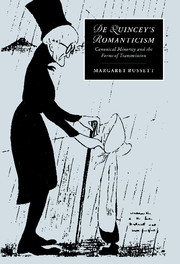Book contents
- Frontmatter
- Contents
- Acknowledgments
- List of abbreviations
- Introduction
- 1 Conversions: Wordsworth's gothic interpreter
- 2 Transmissions: composing The Convention of Cintra
- 3 Impersonations: the magazinist as minor author
- 4 Reproductions: opium, prostitution, and poetry
- 5 Appropriations: the counter-lives of the poet
- Epilogue: minor Romanticism
- Notes
- Index
- CAMBRIDGE STUDIES IN ROMANTICISM
3 - Impersonations: the magazinist as minor author
Published online by Cambridge University Press: 26 October 2011
- Frontmatter
- Contents
- Acknowledgments
- List of abbreviations
- Introduction
- 1 Conversions: Wordsworth's gothic interpreter
- 2 Transmissions: composing The Convention of Cintra
- 3 Impersonations: the magazinist as minor author
- 4 Reproductions: opium, prostitution, and poetry
- 5 Appropriations: the counter-lives of the poet
- Epilogue: minor Romanticism
- Notes
- Index
- CAMBRIDGE STUDIES IN ROMANTICISM
Summary
THE CALAMITIES OF MY NOVICIATE IN LONDON
Distanced from the Wordsworth circle in the aftermath of the Cintra débâcle, De Quincey spent several quiet years confirming his opium habit, reading German philosophy, depleting his modest fortune buying books, and gradually articulating the recondite intellectual and artistic themes that turned his subjective isolation to account. Though he may have written some fragments – perhaps even beginning the “one single work,” De emendatione humani intellectûs, of his magniloquent ambition (C 64) – he published nothing for a decade. As he later wrote, “it had never once occurred to me to think of literary labours as a source of profit. No mode sufficiently speedy of obtaining money had ever occurred to me, but that of borrowing it on the strength of my future claims and expectations” (C 24). But by 1818, recently married and with two young children, he was finally reduced to the point of seeking paid work, and, after publishing an anonymous political pamphlet titled Close Comments Upon a Straggling Speech, secured with Wordsworth's help the editorship of the Westmoreland Gazette. He kept this post for just over a year, supplying almost all the paper's original copy; afterward, in late 1820, he was briefly “engaged” to write for Blackwood's Magazine, the spectacular and salacious monthly edited by his friend John Wilson.
- Type
- Chapter
- Information
- De Quincey's RomanticismCanonical Minority and the Forms of Transmission, pp. 92 - 134Publisher: Cambridge University PressPrint publication year: 1997



